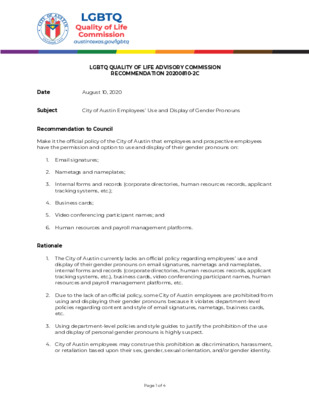20200810-2C: Recommendation Concerning Use of Gender Pronouns by City of Austin Employees and Prospective Employees — original pdf
Recommendation

Date Rationale LGBTQ QUALITY OF LIFE ADVISORY COMMISSION RECOMMENDATION 20200810-2C August 10, 2020 City of Austin Employees’ Use and Display of Gender Pronouns Subject Recommendation to Council Make it the official policy of the City of Austin that employees and prospective employees have the permission and option to use and display of their gender pronouns on: 1. Email signatures; 2. Nametags and nameplates; 3. Internal forms and records (corporate directories, human resources records, applicant tracking systems, etc.); 4. Business cards; 5. Video conferencing participant names; and 6. Human resources and payroll management platforms. 1. The City of Austin currently lacks an official policy regarding employees’ use and display of their gender pronouns on email signatures, nametags and nameplates, internal forms and records (corporate directories, human resources records, applicant tracking systems, etc.), business cards, video conferencing participant names, human resources and payroll management platforms, etc. 2. Due to the lack of an official policy, some City of Austin employees are prohibited from using and displaying their gender pronouns because it violates department-level policies regarding content and style of email signatures, nametags, business cards, etc. 3. Using department-level policies and style guides to justify the prohibition of the use and display of personal gender pronouns is highly suspect. 4. City of Austin employees may construe this prohibition as discrimination, harassment, or retaliation based upon their sex, gender, sexual orientation, and/or gender identity. Page 1 of 4 5. The City of Austin prohibits discrimination, harassment, and retaliation against an employee or prospective employee based on sex, gender, sexual orientation, and gender identity. City of Austin Personnel Policies § I-A Equal Employment Opportunity and Anti- Discrimination 6. The City of Austin prohibits employers from discriminating against an employee or prospective employee based on sex, sexual orientation, and gender identity. City of Austin Code of Ordinances § 5-3-4 Unlawful Employment Practices 7. The State of Texas prohibits employers from discriminating against an employee or prospective employee based on sex. State of Texas Labor Code § 2-A-21.051 Discrimination by Employer 8. The United States prohibits employers from discriminating against an employee or prospective employee based on sex. The United States Civil Rights Act of 1964 Title VII 9. The United States Supreme Court has ruled that Title VII of the Civil Rights Act of 1964 prohibits employers from discriminating against an employee or prospective employee based on sexual orientation or transgender status. Bostock v. Clayton County (2020) 10. Current research shows how important it is to implement inclusive gender pronoun policies in the workplace: a. 1.4 million people in the United States are transgender (Geiger & Graff, 2019) b. 33% of young adults (ages 18-29) know someone who uses gender-neutral pronouns (Geiger & Graff, 2019) c. Almost 50% of people in the United States now see gender as a spectrum and feel comfortable using gender-neutral pronouns (Sosin, 2020; The Harris Poll, 2018) d. LGBTQ-inclusive workplaces generate increased performance, productivity, retention, talent, and well-being (The Human Rights Campaign, 2014) e. Millennials represent the largest share of the workforce in the United States, and members of Generation Z are expected to be the most diverse generation yet (Cilluffo & Cohn, 2019) Page 2 of 4 f. 59% of people in the United States who are part of Generation Z believe that forms and online profiles should include non-binary gender options (Parker et al. 2019) g. Younger generations actively seek employment in organizations that reflect their values of inclusion (Johansson, 2017) h. Transgender employees with supportive coworkers and workplaces have lower rates of suicidal thoughts and attempts (Herman, Brown & Haas, 2019) i. Gender-affirmative support in the workplace can reduce depression, improve self-esteem, and create a better quality of life for transgender employees (Temkin & Vega, 2020) Out & Equal What’s Your Pronoun? Strategies for Inclusion in the Workplace 11. According to recommendations from the Human Rights Campaign, organizations should recognize employees’ chosen name and gender pronouns to the greatest extent possible, including internal and external personnel directories, email addresses, and business cards. Human Rights Campaign Transgender Inclusion in the Workplace: A Toolkit for Employers Page 3 of 4 Vote Date of Approval: August 10, 2020 Motioned By: Commissioner Gonzales Seconded By: Commissioner Wollerson For: 1. Curette 2. Curry 3. Daniels 4. Gonzales 5. Gonzalez 6. Martinez 7. Taylor 8. Wollerson Against: None Abstain: None Absent: 1. Baeza 2. Chavez 3. Doughty 4. Dowling 5. Gorczynski 6. Hines 7. Kirby Attest: _____________________________________________ Kathryn Gonzales, Vice Chair Page 4 of 4